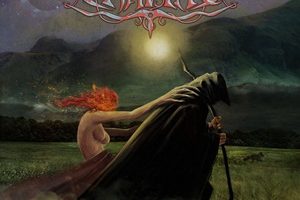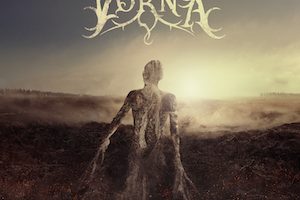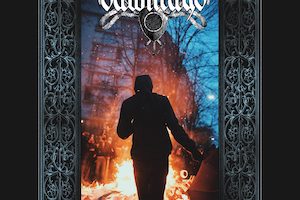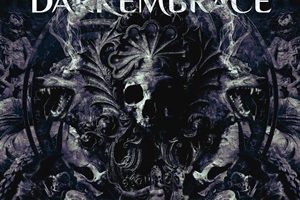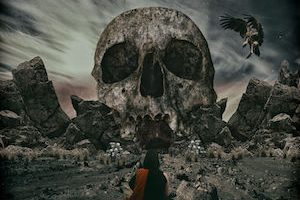Heidevolk – Intensity into Connection
Sunday, 19th February 2023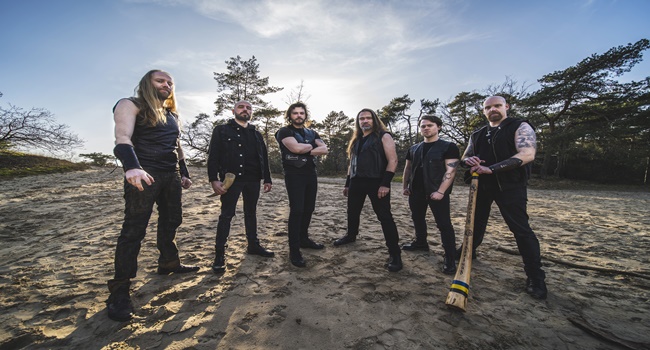
Active since the early 2000’s, Dutch folk/Viking metal band Heidevolk have established a thoughtful discography in their native tongue. Taking their longest break between records for Wederkeer, it wasn’t originally planned to be five years between albums – as bassist Rowan Roodbaert explains early on in this extensive interview. No matter – the record contains some exhilarating moments, moving into darker and acoustic angles while still being very energetic and thoroughly entertaining. We also handle a host of other topics from the membership changes, thoughts regarding the growth of the band with Napalm Records, favorite show/festival memories across Europe and the US, older versus younger metal music development given his judging national battle competitions, discussion on his favorite places to go in nature, and what’s left to accomplish on the bucket list.
Dead Rhetoric: Wederkeer is the seventh studio album for Heidevolk – and the first in five years for the group. Can you provide details regarding the lineup changes that have taken place between records, and where you see this set of material sitting in the discography of the band?
Rowan Roodbaert: Yes, sure. To start, it was not our intention to wait for five years. The last albums we have released in a year and a half to two year intervals, and this time we were going for that as well. We set out to work in a way that we didn’t work with the other albums. We would write the songs mostly in the rehearsal rooms. Vuur van verzet our previous album I wrote all the songs and the lyrics, and produced the pre-production in one on one sessions so it was like the guitar player with me, or one or two singers with me, and we were recording at my home studio. This time we wanted everybody to get together, it would be more of a group product. We set out to do that, a few of us wrote the songs, I wrote a majority of the songs. And then COVID happened. We set out to work in the rehearsal room, but the first thing we couldn’t do was work in groups (laughs). We were not allowed to.
That’s why we had a two-year delay. During this two-year delay, a few of our musicians also stopped playing with us. This is mostly to do with the combination of the band and their day jobs, as well as families. Being in a band is a demanding thing. One of our members, he said this is the first time he had a holiday for more than two weeks. I don’t blame him. They were thinking of other directions musically, and at one point you have to decide if this is it.
I think this is a logical following of Vuur van verzet – although the music is a bit darker. And conceptually, it’s more where with Vuur van verzet we were diving into history, this time we took another approach because we always think there is so much going on. You can watch series 24/7, you have opinions on the internet, we don’t have to have our own opinions anymore. We wanted to take a step back, enjoy nature and the things around you instead of being driven to opinions, driven to binge watch series, or do whatever and get carried away. Let’s take another step back and look at what’s inside, who are you, how have you grown up, what’s important to you, what people are important to you? This is a reaction towards… it happened during COVID, the polarization of the internet. You are urged to have an opinion about every matter. I read a lot, but there are too many things to have an opinion about, nobody has that kind of knowledge. It’s also okay to not have an opinion, to withhold yourself from this. Stop the polarization and look at what is important to you – should you react, and if I react, do I know anything?
It is also common with age to think for yourself, realizing that you are more than just driven by impulses. That’s the concept for this record – and with the music, we took a darker approach. You can hear more influences from our new members – they are true to the Heidevolk tradition. We did more acoustic work as well.
Dead Rhetoric: How important is the imagery and video media to establish the band fully? Are you also active in pushing yourselves through social media platforms to connect better with your audience without being slaves to the technology?
Roodbaert: A very good question. Video is really important nowadays. One of the things about what I just said, people are drawn to death with videos, impulses, and it’s really hard to get the attention of people. When you are doing a video, creating something, even if it’s a small thing, it shouldn’t be a clickbait thing. It is okay to send someone a short video and say look at the whole video. If you clickbait something because you find it shocking or cool, I would rather have something meaningful. You can talk more about the song, about the story, and you can create an atmosphere that you can have stronger imagery. When we work on videos, they should be meaningful.
We interact with the fans on Facebook because it’s important to have the attention of the fans. It’s something we really like to do. You created something, and people are being enthusiastic about it. That’s also what I have with live gigs, you go to a show and want to interact. I want to go into the crowd and talk with people, hear their reactions, talk with them.
Dead Rhetoric: Do you remember the time in your career where you had to explain that you weren’t a political band? Was that something difficult to overcome in the early days?
Roodbaert: I really have to say that this was until 2006-07. I’m happy that this has not been a topic or issue anymore. You can look at everything from us and you can see that we are not a political band. People are not asking. It has been well over fifteen years since having to explain this.
Dead Rhetoric: What has always driven the combination of pagan / folk metal textures as well as expressing yourselves in your native tongue – do you believe you’ve been able to establish your own niche/take on this genre because of these elements?
Roodbaert: Yes, I think so. We’ve done this with other bands from the genre – look at Moonsorrow, look at Korpiklaani. Obviously, those bands have a different style, Finntroll, all in their native tongue. Let’s say you look at those bands, they all sing in their native tongue, and they all make different forms of music. The expression in your native tongue hits you very direct. There are some bands that write English lyrics, although they don’t really know the proper use of English. In the Netherlands, English is spoken well, English-singing bands are quite popular. It’s notable that a lot of Dutch bands sing in English. The way people over here experience the music, English songs can be indirect. They feel strong behind the English lyrics, but it’s indirect – they go more for the feeling. When you write in your native tongue, it’s easier to express yourself of course.
Dead Rhetoric: You’ve been a part of the Napalm Records roster since your second album in 2008 Walhalla wacht. How would you describe the relationship between the label and band – have you been impressed with their growth and understanding of the genre, and how to market plus make things grown on a global scale?
Roodbaert: I think I had this question earlier as well in another recent interview. It’s a good combination, Heidevolk and Napalm Records. When we signed in 2007 just before that album release, I didn’t see anyone from Napalm. The first time I saw anyone from Napalm was during a festival in 2009-10. They were a bit more distant, there were a few guys that were extroverted. During 2011-12 I met more people, and they started growing. In 2015 I met their whole media team, and they were growing with social media. Nowadays they have so many people you can go to a festival and to their merch stand and see them. It’s very nice to see how they’ve grown, they are getting younger as well. You can see what they do, how they work. It’s important because you can pitch new ideas, and they pitch new ideas to us, and we work as a team.
Dead Rhetoric: Where do you see the major differences between the studio and stage for Heidevolk? What have been some of the special moments over your time with the band when it comes to either tours, festivals, or albums where you knew you were making a significant impact with your music?
Roodbaert: To me, the studio is a bit more artificial, of course. You sit there to create the perfect product. I still want to have some feeling with the parts that I play, sometimes I have to do them five to ten times over to play them right. In the studio, the magic really happens when you know your parts, you play them, and you think about what you can improve. Then you know you are building something that you are going to play a thousand times live. And that moment you are building it. It’s more of the construction of the song, the feeling that should be there on the album. And then the live songs – it’s all about the intensity. It’s important to have an intense show, capture the attention of the people, become as one with the crowd. You are connected, and when you run to the right, they run to the right, and so forth. When you have this kind of experience, it’s mind-blowing. Sometimes you have a great experience like that when it’s a very small club, intense, also really sweaty and warm. Sometimes it’s at a huge festival, when you know when I jump now, everybody will go to do this until the last person behind.
It’s always a big joy to play Summer Breeze in Germany – an awesome festival. We’ve played there a few times, our last time over there, it was one o’clock in the afternoon. The whole field was filled with the crowd, it was sunny and a great show. After that there was a storm coming up and they had to cancel the whole day after, it was crazy. It was the feeling that I just talked about; we are connected. For shows, there are a lot of festivals. We are doing Graspop again, we’ve played there several times. They put us on the smaller stages, and they cannot handle the amount of people that want to see us. We were on a stage that can handle about 8,000 people in 2010 and there were 4,000 more people standing outside, watching the show. The second time we were on an outside stage built for 10,000 people, and there were 15,000 people standing over there, blocking everything. They have booked us on a bigger stage. The first time we were in the US back in 2013, those shows were amazing as well. I remember the DNA club in San Francisco, California, that was crazy.
Dead Rhetoric: Coming out of the global pandemic, what is your sense of how the metal industry will develop out of this prolonged absence from shows/tours/festivals? How do you see humanity as well coming out of this unprecedented time in our history?
Roodbaert: I think it was one of the worst times ever. I’m very lucky that I didn’t experience anything horrible. For me, it was a really bad time because, I got mentally stuck, underwhelmed. I’m used to playing shows, going out, having these experiences that give you a bit of adrenaline, endorphins. At one point, the theme parks were open again, so I managed this by going on roller coasters. It has been a very weird time for a lot of people. For the music industry, what I see now, it’s going like crazy. There are a lot of people that didn’t make it. What I can see right now, it’s really hard to book tours, get a venue anywhere. It could be a lot worse, but it will be very interesting for the young people that lived through the COVID years. I’m 40 now. When you are 16 and go through to 18 where you had to live through restrictions, where you can’t go out on the weekends. I’m curious how this will translate – after every crisis, there is usually a reaction. We’ve seen it in the 1990’s, the whole grunge movement came up after the recession. The angry youth had the power, so I’m curious how this will translate for humanity in general. One thing we’ve learned is we should all not be on the internet all at once (laughs).
Dead Rhetoric: You have a love of nature and travel – what are some of the best places you’ve ever been to or experienced, and do you remember when your love of nature first started?
Roodbaert: My love of nature first started when I was younger. My mother and father didn’t have much money, so instead of going to museums or parks, we would always go to the forest, and we would wander around, take walks. My brother and I were very enthusiastic about going into the woods. That feeling has never waned. I’m a five-minute walk from a beautiful piece of nature, when I have the time I go to the forest, have a hike, see wild animals. It has been present as long as I can remember.
Places I’ve been to. There are so many beautiful places. Around Christmas I was in New Zealand, and that’s crazy to take in the forests there. They are from the earliest days, very old. When I was walking through there with my wife, I was walking on roots, everywhere. It was a really crazy experience. This is from millions of years of trees dying, living again. It’s such a network, the different ecosystems you have over there. It was a mind-blowing experience.
Dead Rhetoric: Can you discuss the importance of assembling the right team behind you as far as management, booking agents, road crew, etc. to make thing easier for the band to concentrate more on music-related activities?
Roodbaert: Yeah. It’s really important, of course. The crew behind the band are as important as the band itself when it comes to the shows. When you know you have the right crew, you know you don’t have to worry about a thing. When you are on stage, you should not worry about a thing. At the time, the crowd should be the most important thing to you. You should not think about is my guitar sounding okay. Knowing you have the crew that can pull it off is important. Most of the time, the crew gets paid more than us, but that’s because they are awesome.
Dead Rhetoric: You’ve also been a judge for an annual metal battle finals within your home country. How do you feel about the strength of talent within your home country as far as younger bands – and how their approach may differ a bit from the older generation of acts?
Roodbaert: Oh yeah. That’s a really big topic. Back in the days, you start a garage band, took up an instrument, and maybe some of us had lessons, music lessons. You were going to play what you want and take lessons afterwards. Nowadays we have The Metal Factory, Rock City, the Rock Academy, which is all great because when you see those bands play, its very young people that play like they have been in a band for ages. Sometimes I’m just watching a metal battle, and thinking how are they not world famous? Then there’s this thing that drops, you can see the bands that play metal like that, there is still no feeling behind it that it should have. They are not growing organically. They are killing it, but playing something that was built up in a very short time. That’s what I think is mostly different between a band that has been playing ages ago and growing steadily versus the bands that are coming from a school. Although I still think it’s a great thing. There will be bands breaking through hopefully with really original ideas.
Dead Rhetoric: What’s on the agenda for activities related to Heidevolk over the next twelve months to support this release? What sort of goals are left on the bucket list to achieve either personally for yourself as a musician, or the band in general?
Roodbaert: (laughs). There are several things on the bucket list. It’s important that we find a good European tour first, and a good US/Canada tour. It’s really important to see the fans again. We have missed them as much as well. When COVID started we had a tour planned with Tyr in the US/Canada, we were gutted that it didn’t happen. That’s something we have to make right. As for bucket list things. It would be great to tour Japan or Asia, Australia. Different kind of flights, that would be great. There are still a lot of festivals I haven’t played, or have played, that are still on the bucket list.












